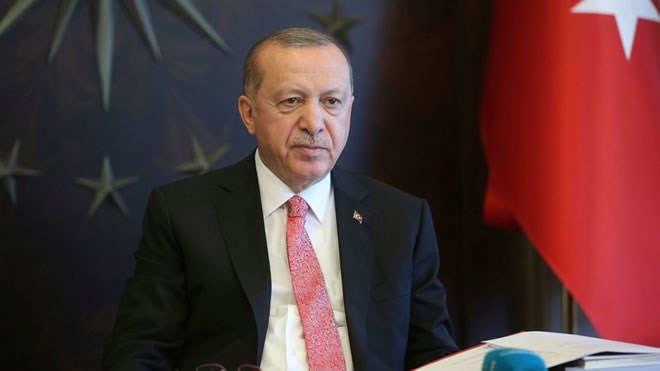Turkey is accusing Greece, Cyprus, Egypt, France and the United Arab Emirates of seeking an “alliance of evil” after these countries issued a joint declaration denouncing Ankara’s policies in the eastern Mediterranean and Libya

Tuesday May 12, 2020

Turkish President Recep Tayyip Erdogan, listens during a teleconference with his cabinet in Istanbul, Monday, May 11, 2020. Erdogan announced a new four-day curfew to stem infections, that includes the weekend and a public holiday on May 19. The country has opted to impose short weekend curfews, instead of full lockdowns, fearing their possible negative effects on the already troubled economy.(Presidential Press Service via AP, Pool)
ANKARA, Turkey -- Turkey on Tuesday accused Greece, Cyprus, Egypt, France and the United Arab Emirates of seeking to form an “alliance of evil” after these countries issued a joint declaration denouncing Ankara’s policies in the eastern Mediterranean and Libya.
In a strongly-worded statement, Turkish Foreign Ministry spokesman Hami Aksoy said the five countries were pursuing “regional chaos and instability” in the eastern Mediterranean and sacrificing Libyans’ “hope for democracy for the reckless aggression of dictators.”
The foreign ministers of the five countries held a teleconference on Monday to discuss the situation in the eastern Mediterranean, where Turkey has been drilling for potential hydrocarbon deposits in an offshore area where Cyprus has exclusive economic rights, as well as the situation in Libya.
Last year, Turkey signed a contested maritime border delineation deal as well as a military cooperation agreement with the internationally-recognized government in Tripoli.
The five nations denounced what they said was Turkey’s sixth attempt in less than a year to “illegally conduct drilling operations in Cyprus’ maritime zones.”
Turkey doesn’t recognize ethnically divided Cyprus as a state and claims much of its exclusive economic zone as its own. It has dispatched warship-escorted vessels off Cyprus to drill for gas, insisting that it’s acting to protect its interests and those of Turkish Cypriots to the area’s natural resources.
Cyprus was split in 1974 when Turkey invaded after coup by supporters of union with Greece. A breakaway Turkish Cypriot state is recognized only by Turkey.
The five also protested the agreements signed with Libya’s U.N.-backed government as a violation of international law and the U.N. arms embargo in Libya.
”(The) Ministers strongly condemned Turkey’s military interference in Libya, and urged Turkey to fully respect the UN arms embargo, and to stop the influx of foreign fighters from Syria to Libya. These developments constitute a threat to the stability of Libya’s neighbors in Africa as well as in Europe,” the five nations declared.
In its response, the Turkish Foreign Ministry accused Greece and Cyprus of avoiding dialogue with Turkey and faulted Egypt for not protecting the rights and interests of its own people. It also charged the UAE of joining the others out of hostility against Turkey and blamed France for allegedly seeking to act as a “patron” to the alliance.
“We call on these countries to act in line with common sense, international laws and practices,” said Aksoy, the Turkish Foreign Ministry spokesman. “Peace and stability in the region can be established with sincere and genuine dialogue, not through alliances of evil.”
——
Associated Press Writer Menelaos Hadjicostis in Nicosia, Cyprus contributed.